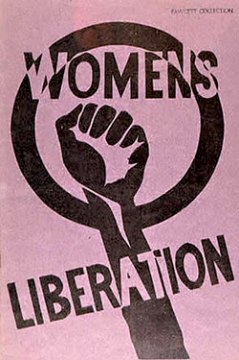Definition: A feminist advocates or supports the rights and equality of women.
Feminism first started with a very well known story. A story from the book of Genesis, a Judaic creation story. This story highlights the way in which the world was created, and then him creating man. First he made Adam (Hebrew translation: Man) second he made Eve (Woman), this created many arguments as many people saw a direct divide between Man and Woman. God made man in his image and thus they were immortal. Later, the snake tempts Eve to eat from the Tree of Life. After eating from the tree herself Eve then tempts Adam, God then gets angry, and gets rid of their immortality and privileges as they disobeyed him. Moreover, the fact that Eve got tempted by the snake started the many attitudes of Men being ‘superior’ and Women being ‘inferior’.
However during this time most women were either pregnant, married or too young to bare children. Also women were banned from churches due to the fact they were either pregnant, busy or on a period.
The Industrial Revolution played a huge part in feminism. This was due to during the time of the Revolution it was only Boys who were educated. This was due to the fact that it would be them providing for their families as girls were taught by their mothers as they would only take the task of common household chores.
In class we were also told about Mary Wollstonecraft who produced a book called ‘A vindication of the Rights of Women’ in order to portray that women are not inferior, they are only deemed so due to the many myths that are about during this time. She is deemed as the first feminist and therefore it is her who has inspired many more to follow in her footsteps.
As I found this topic fairly interesting I decided to go and look further into the subject of feminism.
The modern day feminist movement should surely be attributed to Emily Pankhurst along with her fellow suffragettes who chained themselves to parliament in the bid to win the right to vote alongside their male counterparts thus being equal.
The second trigger point as far as feminism is concerned is the onset of the second world war. At this time women took on the roles that the men could no longer do as they went off to war. Jobs included: engineering; factory work; farming; driving; telecommunications and even supporting the civil powers as police women. In a strange sort of way the second world war was in fact a God send as far as the feminist movement is concerned because after the war women were no longer regarded as second class citizens indeed would not tolerate it and were in no mood to do so.
However, the rights that they had gained to this point still fell short of the rights that men enjoyed. There was still the issue of equal pay in the work place, the right to work full time and lastly the right to abort without their husbands consent.
A major jump towards absolute equal pay was made by the women at the Daghanem ford motor company factory in 1968 where they took on a major company concerning equal pay. They defied both their employer and more importantly the male run union.
In conclusion the issue concerning equal pay over the last century has culminated with the enactment of the ‘Equal Pay and Equality Act 2010’. It is blatantly obvious for the most parts of the United Kingdom, Europe and perhaps the USA are endeavoring to close the gap between men and women’s rights or lack of them. However, the rest of the world especially the middle and far east, Africa and South America the issue of equality for both men and women remains a minor issue as far as political leaders are concerned.

